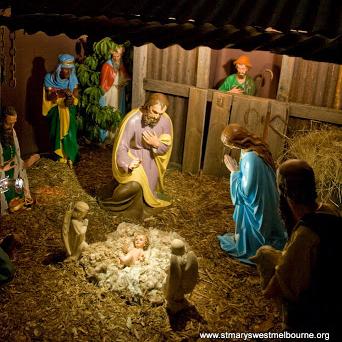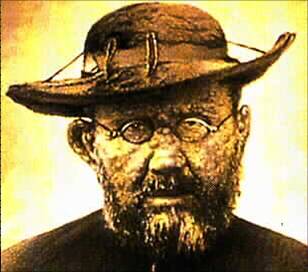“Don’t neglect your spiritual reading,” one of the saints advises us. “Reading has made many saints.” (Straight from the horse’s mouth!)
I guess the most beneficial spiritual reading either inspires us to make new aspirations, or challenges us to renew existing ones. But every now and then, spiritual reading is astounding for its sheer resonance. “I could have written this!” I’ve occasionally thought to myself. “It’s like the fruit of my own prayer.”
Today was just such a moment, when I read a meditation by Robert Hugh Benson on divine friendship. It moved me very much. And since Benson’s work is in the public domain, I can reproduce it here.
(I especially like the third part. The frustration Benson describes is very honest, very like my own, and like yours too perhaps.)
It seems inconceivable at first sight that a relationship, which in any real manner can be called a friendship, should be possible between Christ and the soul. Adoration, dependence, obedience, service, and even imitation — all these things are imaginable; but until we remember that Jesus Christ took a human soul like our own — a soul liable to joy and to sorrow, open to the assaults of passion and temptation, a soul that actually did experience heaviness as well as ecstasy — the pains of obscurity as well as the joys of clear vision — until this becomes to us, from a dogmatic fact apprehended by faith, a vital fact perceived by experience, a full realisation of his friendship is out of the question.
For just as in the case of ordinary persons the plane of real friendship lies in the communion of the two souls, so it is between Christ and a man. His Soul is the point of contact between his divinity and our humanity. We receive his body with our lips; we prostrate our whole being before his divinity; but we embrace his soul with ours.
I. The beginnings of friendship
Human friendships usually take their rise in some small external detail. We catch a phrase, we hear an inflection of a voice, we notice the look of the eyes, or a movement in walking; and the tiny experience seems to us like an initiation into a new world. We take the little event as a symbol of a universe that lies behind; we think we have detected a soul exactly suited to our own, a temperament which either from its resemblance to our own, or from a harmonious dissimilarity, is precisely fitted to be our companion.
Then the process of friendship begins; we exhibit our own characteristics; we examine his: in point after point we find what we expected to find, and we verify our guesses; and he too, no less, follows the same method, until that point is reached (as it is reached in so many cases, though not, thank God! in all), either in a crisis, or after a trying period, when we discover either that we have been mistaken from the beginning, or that we have deceived the other, or that the process has run its course; the summer is come and gone, and that there are no more fruits to gather on either side.
Now the Divine Friendship — the consciousness, that is to say, that Christ desires our love and intimacy, and offers his own in return — usually begins in the same manner. It may be at the reception of some sacrament, such as we have received a thousand times before; or it may be as we kneel before the crib at Christmas, or follow our Lord along the way of the cross. We have done these things or performed those ceremonies dutifully and lovingly again and again; yet on this sudden day a new experience comes to us.
We understand, for example, for the first time that the Holy Child is stretching his arms from the straw, not merely to embrace the world, but to embrace our own soul in particular. We understand as we watch Jesus, bloodstained and weary, rising from his third fall, that he is asking our own very self in particular to help him with his burden. The glance of the divine eyes meets our own; there passes from him to us an emotion or a message that we had never before associated with our own relations with him.
The tiny event has happened! He has knocked at our door, and we have opened; he has called and we have answered. Henceforth, we think, he is ours and we are his. Here, at last, we tell ourselves, is the Friend for whom we have been looking so long: here is the Soul that perfectly understands our own; the one Personality which we can safely allow to dominate our own. Jesus Christ has leapt forward two thousand years, and is standing by our side; he has come down from the painting on the wall; he has risen from the straw in the manger — my Beloved is mine and I am his. . .
II. Now begins its process
The essence of a perfect friendship is that each friend reveals himself utterly to the other, flings aside his reserves, and shows himself for what he truly is.
The first step therefore in the Divine Friendship is the revelation by Jesus of himself. Up to this point in our spiritual life, however conscientious or dutiful that life may have been, there has been a predominant element of unreality.
It is true that we have obeyed, that we have striven to avoid sin, that we have received grace, forfeited it and recovered it, that we have acquired merit or lost it, that we have tried to do our duty, endeavoured to aspire and to love. All this is real, before God. But it has not been real to ourselves.
We have said prayers? Yes. But we have scarcely prayed. We have meditated — set the points before us, reflected, resolved and concluded — but the watch has been laid open before us to mark our progress, lest we should meditate too long.
But after this new and marvellous experience, all is changed. Jesus Christ begins to exhibit to us not merely the perfections of his past, but the glories of his presence. He begins to live before our eyes; he tears from himself the conventions with which our imaginations have clothed him; he lives, moves, speaks, acts, turns this way and that before our eyes. He begins to reveal secret after secret hidden in his own humanity.
We have known facts about him all our life; we have repeated the Catholic creed; we have assimilated all that theology can tell us. Now, however, we pass from knowledge about him, to knowledge of him. We begin to understand that “this is eternal life: That they may know thee, the only true God, and Jesus Christ, whom thou hast sent.” (Jn 17:3) Our God is becoming our Friend.
On the other side he demands from us what he himself offers. If he strips himself before our eyes, he claims that we should do the same. As our God he knows every fibre of the being which he has made; as our Saviour he knows every instant in the past in which we have swerved from his obedience: but, as our Friend, he waits for us to tell him.
It is tolerably true to say that the difference between our behaviour respectively to an acquaintance and to a friend, is that in the first case we seek to conceal ourselves, to present an agreeable or a convenient image of our own character, to use language as a disguise, to use conversation as we might use counters; and in the second case that we put aside conventions and makeshifts, and seek to express ourselves as we are, and not as we would have our friend to think us to be.
This then is required of us in the Divine Friendship. Up to now our Lord has been content with very little: he has accepted a tithe of our money, an hour of our time, a few thoughts and a few emotions, paid over to him in religious intercourse and worship. He has accepted those things instead of ourselves. Henceforth he demands that all such conventions should cease; that we should be entirely open and honest with him, that we should display ourselves as we really are — that we should lay aside, in a word, all those comparatively harmless make-believes and courtesies, and be utterly real.
And it is probably true to say that in practically every instance where a soul believes itself disillusioned or disappointed with the Divine Friendship, it is not that the soul has actually betrayed the Lord or outraged him or failed to rise to his demands in other matters; but that the soul has never truly treated him as a friend at all; the soul has not been courageous enough to comply with that absolutely necessary condition of all true friendship, namely, a complete and sincere straightforwardness with him.
It is far less injurious to friendship to say outright, “I cannot do this thing that is asked of me, because I am a coward,” than to find excellent reasons for not doing it.
III. The myriad course
Roughly speaking, then, this is the course which the Divine Friendship must take. We must consider later in detail the various events and incidents that characterize it. For it is an immense consolation to remember that there is not one such incident that has not been experienced by other souls before us. The Way of Divine Love has been trodden and retrodden already a thousand times. And it is useful, too, to reflect, before going further, that since this Friendship is one between two human souls, it will follow in a great degree the regular lines of all other friendships.
There are moments in it of bewildering bliss, at communion or in prayer — moments when it appears (as indeed it is) to be the one supreme experience of life; moments when the whole being is shaken and transfused with love, when the Sacred Heart is no longer merely an object for adoration, but a pulsating thing that beats against our own; when the Bridegroom’s arms are about us, and his kiss on our lips. . . .
There are periods too of tranquillity and steady warmth, of an affection at once strong and reasonable, of an esteem and an admiration satisfying to the will and the intellect, as well as to the sensitive or emotional parts of our nature.
And there are periods, too — months or years — of misery and dryness: times at which it seems as if we actually needed patience with our divine friend; cases in which he appears to treat us with coldness or disdain. There will actually be moments in which it needs all the loyalty we have not to cast him off as fickle and deceptive. There will be misunderstandings, darknesses, obscurities.
Yet, as time passes, and as we emerge through these crises one by one, we come more and more to verify that conviction with which we first embraced our Friend. For this is indeed the one Friendship in which final disappointment is impossible; and he the one Friend who cannot fail. This is the one Friendship for whose sake we cannot humiliate ourselves too much, cannot expose ourselves too much, cannot give too intimate confidences or offer too great sacrifices.
It is in the cause of this one Friend only, and of his Friendship, that the words of one of his intimates are completely justified:
“I count all things to be but loss for the excellent knowledge of Jesus Christ my Lord; for whom I have suffered the loss of all things, and count them but as dung, that I may gain Christ.” (Phil 3:8)





Recent Comments